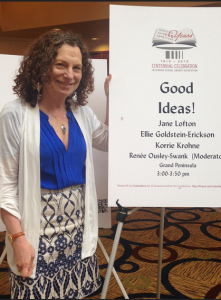I had a jam-packed four days of learning, sharing, and networking at the California School Library Association (CSLA) Centennial Conference February 5 – 8 at the Hyatt Regency, San Francisco Airport. I came away with:
- Notes of many great new books to purchase for our library from Michael Cart’s workshop on “Best of the Best Young Adult Books”
- New ideas of ways to help students become astute researchers and agents for change from author Paul Fleischman’s “Eyes Wide Open: Going Behind the Environmental Headlines” workshop
- Inspiration from opening Keynoter Michelle Luhtala to move more learning activities to where students love to be, on digital devices, and to make learning help available virtually on demand
- Inspiration from closing keynoter Shannon Miller to implement more activities that break down the library and school walls and help students connect with the world
- At least a year’s worth of lesson and program ideas and tools to engage students from so many talented colleagues whose sessions I attended and with whom I networked
- Excited product purchase ideas from the many wonderful vendors who support school libraries and exhibited during the conference
I also did a lot of sharing at this conference. Here is information about my four presentations:
AASL’s Best Websites for Teaching and Learning: I presented this session with Sue Heraper. Here is a link to our slide deck.
Of all the sites we shared, I think our attendees especially liked the hands-on demos we did of how to use two of them, Kahoot and Socrative, to quiz or survey students during lessons.
Blogging, Digital Timelines, & More with Embedded Digital Citizenship: This was a short presentation I did to share the project for which I won a Good Ideas! Award. These awards are given for collaborative projects done by a teacher librarian and classroom teacher that can serve as a model for easy replication by our colleagues. The project I shared came from my collaborative work with Spanish Teacher Anita Rossell and her Spanish for Native Speakers Class. Here is the link to my slides for this talk. I will also be talking at more length about blogging at the CUE conference next month.
Going for Moonshot Thinking: The Latest from Google from Two Googly Teachers: Amy McMillan, a middle school English teacher working on her teacher librarian credential, and I met at the Google Teacher Academy in Mountain View last summer. We co-presented this session to share some of our takeaways from the Academy and to encourage more teacher librarians to apply to attend future academies. As with almost every session I present, we learned so much more as we prepared and compared notes on our different practices. Here is a link to our slides. We also recorded this session using Google Hangouts on Air:
Make Twitter Your #1 Tool for Building a Personal Learning Network: Marie Slim and I prepared this session, an update of one we did last year. We are both passionate about the value of Twitter for learning and wanted to get more of our members on board using it at conferences and for learning and networking throughout the year. Unfortunately, Marie wasn’t able to be at the conference, so I did the presentation on my own. Here is a link to the session presentation Prezi. I also recorded this session with Google Hangouts on Air:
As Social Media/Website Chair for the conference, I did a lot of tweeting and encouraged tweeting by all our participants. In fact, I taught a four-week course on Twitter (which the presentation above was a short summary of) to help prepare more members to tweet during the conference. Although the course is now done, all the material is available to read and use on the course website. One great use of Twitter is to share highlights of conference sessions and events. Here is a Twitter summary of the conference, captured using Storify. You can see as you scroll through the tweets that, while we work very hard learning at conferences, we also have a lot of fun! This conference was CSLA’s Centennial, so it also included a wonderful Gala celebration of this amazing milestone.










